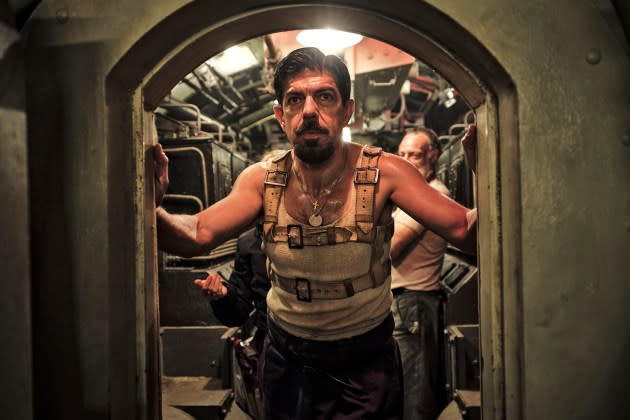‘Comandante’ Review: Edoardo De Angelis’ Well-Crafted Wartime Sub Drama Is Out Of Its Depth As An Opening Attraction – Venice Film Festival

A 73m x 7m submarine was always going to be a left-field substitute for A-lister Zendaya after Luca Guadagnino’s hotly anticipated tennis movie Challengers was pulled from the Venice Film Festival’s prestigious opening-night slot. And although the gargantuan Cappellini is a formidable presence in Edoardo De Angelis’s 1940-set war drama, Comandante seems woefully out of its depth as a curtain-raiser to a festival still reckoning with the effects of the SAG-AFTRA strike.

Held together by a very strong performance by Pierfrancesco Favino as sub commander Salvatore Todaro, De Angelis’ film takes a long time to set sail, beginning with a strange prologue in which we see Todaro plunging into the sea. This is his first brush with death, and it leaves him severely disabled, being forced to wear a back brace and prescribed serious doses of morphine. “I like you disabled,” says his wife, Rina (Silvia D’Amico). “It makes you a prisoner of me and my intentions.” This sounds pretty dark, but, in fact, she just wants him to take his war pension and retire to the countryside with her and their young son. But Salvatore does not, and chooses to return instead to the theater of war, taking the Cappellini and its crew through the treacherous Strait of Gibraltar to the Atlantic Ocean.
More from Deadline
RELATED: Venice Film Festival @ 80: Memorable Moments & Stars 1932-2023 – Photo Gallery
After a lot of scene-setting, with tearful wives seeing off their husbands and Todaro leading his men in a hearty singalong, the story begins in earnest when the sub pulls away on 29 September 1940. There’s an air of impending doom about all this — “The boys were going to war full of nerves and boiling blood,” notes one partner — which creates an expectation the film doesn’t really end up delivering, since this turns out to be the very opposite of a suicide mission. Nevertheless, De Angelis continues to suggest that no one will be coming back, notably with ominous dialogue like, “The mariner’s art is to die at sea.”
Life on the Cappellini is beautifully rendered, and though the shadow of Wolfgang Petersen’s Das Boot is hard to escape, De Angelis manages to do so, with impressive ease. In the early stages of the voyage, there’s a lived-in calm, and there’s a nice touch when the ship’s communications guy puts Radio Andorra on its sound system so the boys can hear Billie Holiday’s “Fine and Mellow.” Favino is impressive, too, playing “the craziest and wildest” commander in the Italian navy as a combination of William Wallace and Captain Haddock. VFX work is extensive but not intrusive, and the film’s standout sequence involves a young sailor sacrificing his life to untangle the sub from a field of mines, an undersea sequence shot in breathtaking real time until the man’s final breath expires.
The real story, however, begins when Todaro spots the Kabalo, a Belgian merchant ship with its lights off. Todaro only sinks “enemy iron” when firepower is visible, and this ship has a cannon on its deck. After blasting it into the depths of the sea, however, Todaro has mercy on the survivors, who plead innocence, and, at great risk to himself and the others, takes them on board and offers to drop them off at the closest neutral port. The fact that some of these newcomers have to be stationed, freezing, in the conning tower — the fin-like protuberance that gives the craft its shark-like shape — means that the Cappellino cannot dive without killing them, making it an easy daytime target for British bombers. The film’s low-key but brilliant score, co-written by Massive Attack’s Robert Del Naja (aka 3D), plays a big part in creating tension here, being an orchestration of beats and organic industrial noises that stretches the traditional concept of soundtrack music.
RELATED: Venice Film Festival 2023: An Edition Unlike Any Before Is Throwing Up Plenty Of Talking Points
History later would reveal that the Kabalo actually was running arms for the British, which would not have sat well at the time with Todaro’s men, who are seen throwing darts at a picture of Winston Churchill. But Todaro himself doesn’t seem to mind, being more committed to the rules of nature than the laws of man (“We’re not at war, we’re at sea,” he sort-of says, to paraphrase an exchange that clarifies this philosophy). At this point, the story starts to run out of steam, since it becomes quite clear that, despite the doomy bleakness and world-weary paranoia of the first hour, De Angelis is not about to kill off his cast, no matter how many British planes might be hovering like mosquitoes on the horizon.
Reactions were muted at the first Venice press screening, but it seemed to play well with the Italians in the house, who laughed heartily at some of the jokes, notably the cook’s reference to Neapolitans and their penchant for frying everything on the menu. It’s also quite unusual to see a war film in which the Italians are the heroes, for once. Otherwise, Comandante is just fitfully entertaining, an adventure yarn about a local hero that will struggle to find audiences internationally.
Title: Comandante
Festival: Venice (Competition)
Director: Edoardo De Angelis
Screenwriters: Edoardo De Angelis, Sandro Veronesi
Cast: Pierfrancesco Favino, Johannes Wirix, Giuseppe Brunetti
Running time: 2 hr
Best of Deadline
SAG-AFTRA Interim Agreements: Full List Of Movies And TV Series
Venice Film Festival @ 80: Memorable Moments & Stars 1932-2023 - Photo Gallery
Sign up for Deadline's Newsletter. For the latest news, follow us on Facebook, Twitter, and Instagram.

 Yahoo News
Yahoo News 